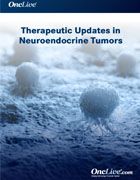Publication
Video
Dr. Chauhan on the Role of Somatostatin Analogs Treating GEP-NETs
Author(s):
Aman Chauhan, MD, discusses the role of somatostatin analogs in treating patients with gastroenteropancreatic neuroendocrine tumors.
Aman Chauhan, MD, a medical oncologist at University of Kentucky, discusses the role of somatostatin analogs in treating patients with gastroenteropancreatic neuroendocrine tumors (GEP-NETs).
Somatostatin analogs form the backbone of treatment for patients with GEP-NETs and changed the way these are managed, explains Chauhan. Somatostatin analogs are often used for frontline treatment of patients with GEP-NETs and work well for those with functional and nonfunctional NETs, evident through the randomized CLARINET study, says Chauhan. This phase III study examined lanreotide (Somatuline Depot) versus placebo in patients with metastatic GEP-NETs.
In addition to being effective in treating patients with GEP-NETs, somatostatin analogs are well tolerated with a better safety profile than traditional chemotherapy, targeted therapy, or radiation-based therapy, concludes Chauhan.










